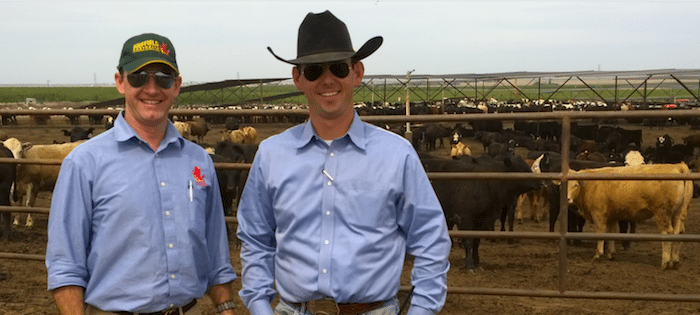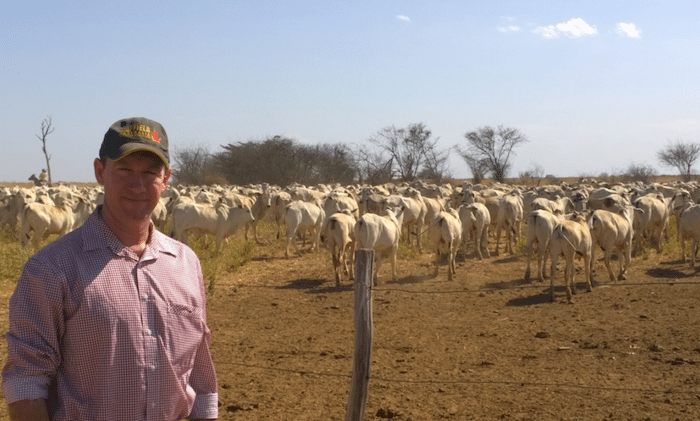
Michael Lyons (left) and Troy Murray, Assistant Manager of Harris Ranch’s 110,000ha feedlot in California, USA.
The imperative of implementing strategies in northern beef production, so as to strengthen both profitability and the preservation of natural assets, has been highlighted by a new report from 2014 Nuffield Scholar, Michael Lyons.
Michael and wife, Michelle, manage well-known Charters Towers district property ‘Wambiana Station’ which has been held by the Lyons family for more than 100 years. The enterprise now encompasses breeding and selling bulls, growing out steers and trading cattle, along with hosting school and university students from Australia and overseas for educational camps.
It was Michael’s extensive and long-running observation of the northern cattle industry, and its struggle to achieve profitability over the past decade, that inspired him to seek global strategies to help restore strength to the sector through his scholarship, funded by Meat and Livestock Australia (MLA).
His research is a prime example of the topics in focus at this year’s Nuffield National Conference being held in Darwin, from 19 to 21 September 2017. The event will provide a national forum for a range of exceptional speakers and sessions, with a particular emphasis on unlocking the potential of agriculture in Northern Australia.
Attendees will hear from a variety of Nuffield Scholars like Michael, who have spent the past two years fine-tuning their research on areas such as infrastructure development, economic management, human resourcing, connectivity and, most notably, resource protection in the region.
Michael said his commitment to ‘work with nature’ led him to further refine his investigation to exploring holistic business strategies applicable to the northern production region.
“Our family has owned Wambiana since 1912, so we have been the custodians of this land for over a century,” Michael said.
“It is a responsibility we take seriously and hence we believe it is important for our business to be both economically profitable and ecologically sustainable.
“Achieving profitability in the northern beef industry, in which we operate, has been challenging for many producers and where there is no profit there is usually no sustainability – the land and pastures are over-utilised and the people in the business become over-worked.
“I was keen to look at what other people from similar environments around the world were doing to work with nature for profitable futures.
“My report highlights the importance of looking at the environment, economics and people as a ‘whole’ as opposed to isolated ‘parts’ when making decisions for your family and grazing business.”
- Specifically, Michael’s research investigated key drivers of ‘sustainable profits’ including:
Selection of fertile, adapted cattle
Optimising grazing management
Breeding polled cattle
Complementary enterprises.
This work took Michael to New Zealand, Mexico, Brazil, Argentina, Chile, the United States, the United Kingdom and the United Arab Emirates in search of graziers and farmers who are registering profits through the implementation of forward-thinking and innovative production techniques and decision making.
The experiences of these progressive primary producers lead him to develop a range of recommendations aimed at assisting northern producers in strategic planning to benefit both profits and the long-term resilience of their businesses.
“One of the key profit drivers in the northern beef industry is herd fertility, as adapted, fertile cattle perform well with limited inputs, which is good for business and good for the environment,” Michael said.
Michael suggests developing strategies for selecting cattle that are adapted to northern conditions.
“Stick to your plan and the cattle that are suited will reproduce and thrive, while the cattle that are not adapted should be removed. This will allow you to move the herd more quickly towards your goal,” Michael said.
“Also, find a level of grazing intensity that fits with your goals and do not let stocking rates exceed carrying capacity, while also ensuring plants have the opportunity to recover after grazing.
“Good management of grazing will increase the vigour and biodiversity of pastures with each season, while good management of genetics will lead to each generation of your herd being better than the previous.”
Michael said, with increasing scrutiny of animal husbandry practices, an increase in polled genetics across northern herds could also have vast benefits.
“Consider increasing the proportion of polled cattle in your herd as animal welfare, staff welfare and gross margin profitability trends support polled cattle,” he said.
He also urged producers to investigate means of business diversification so as to create further profitability and commercial resilience.
“Diversification is an effective way to spread risk in a business and prevent ‘leakage’ of underutilised resources,” he said.
“On-farm diversification tends to either be in intensifying production vertically or branching out into new but complementary enterprises.”
However, Michael said simply being motivated to action changes was the important first step in realising improved business performance and ‘sustainable profitability’.
“A rudder can’t give any direction to a boat without some motion,” he said.
“Similarly in business, try a new idea and monitor the result – you can always make another decision to refine your direction.”
Source: Nuffield Australia. The 2017 National Conference (19-21 September, Darwin) is Nuffield Australia’s flagship annual event, offering a meeting point not only for Scholars and Investors but the broader agriculture industry and in 2017, a unique insight to northern agriculture. To secure your place, or for more information, click here.




HAVE YOUR SAY